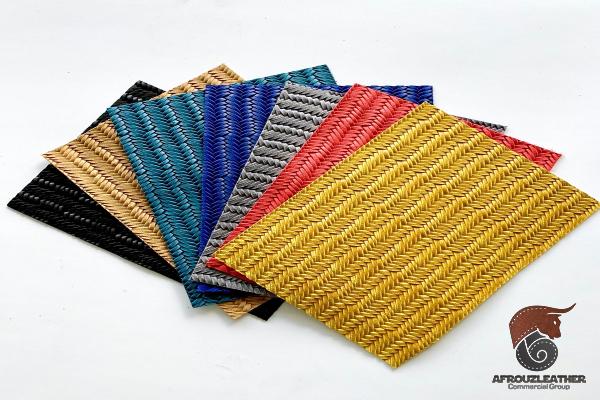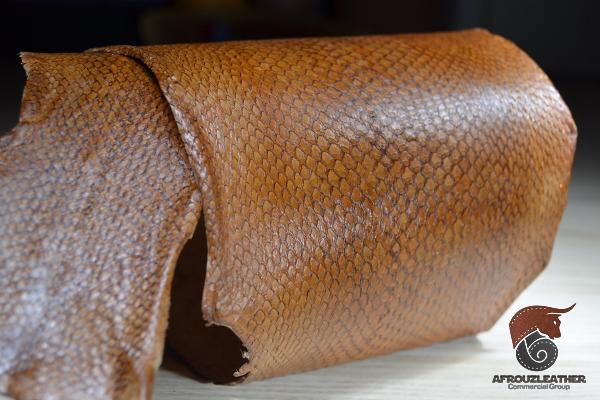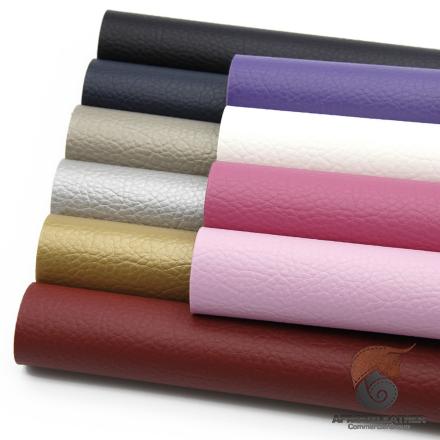Sheep leather is considered one of the most valuable raw materials in the textile and fashion industry. Known for its excellent quality and natural properties, sheep leather has gained popularity among designers and consumers alike. In this article, we will explore the distinctive features and advantages of sheep leather, its sourcing and production processes, and its varied applications in the fashion industry. Sheep Leather: A Superior Raw Material: Sheep leather is highly regarded for its softness, suppleness, and durability. It possesses excellent natural insulation properties, making it suitable for a wide range of applications, including clothing, footwear, accessories, and upholstery. The texture of sheep leather, characterized by fine grains and an even surface, lends itself well to intricate detailing and finishing processes. Sheep Breeds and Origin: Sheep leather can be sourced from various sheep breeds around the world. Merino sheep, famous for their fine wool, are particularly renowned for their high-quality leather. Other notable sheep breeds that contribute to the sheep leather industry include Corriedale, Romney, and Scottish Blackface, among others. Different regions have their unique sheep breed and climate, leading to variations in the characteristics of the sheep leather produced.
leather
 Sheep Leather Production: The production of sheep leather involves several stages, including shearing, skin preservation, tanning, and finishing. Shearing of the sheep is typically performed annually, and the skin is carefully preserved to prevent any damage or decay. Tanning is a crucial step in leather production, where the raw sheepskin is chemically treated to transform it into a stable, durable material. This process imparts various properties to the leather, such as color, texture, and resistance to water and abrasion. Lastly, the finished leather is subjected to finishing techniques, such as buffing and polishing, to enhance its aesthetic appeal. Advantages of Sheep Leather: 1. Softness and Comfort: Sheep leather is known for its exceptional softness and suppleness, ensuring maximum comfort for the wearer. 2. Breathability: Sheep leather allows the free flow of air, helping to regulate temperature and prevent excessive sweating. 3. Durability: The strong and resilient fibers of sheep leather result in long-lasting products that can withstand daily wear and tear. 4. Versatility: Sheep leather can be manipulated to create a variety of finishes, textures, and colors, enabling endless design possibilities. 5. Natural Insulation: Sheep leather possesses natural insulation properties, keeping the wearer warm in colder climates.
Sheep Leather Production: The production of sheep leather involves several stages, including shearing, skin preservation, tanning, and finishing. Shearing of the sheep is typically performed annually, and the skin is carefully preserved to prevent any damage or decay. Tanning is a crucial step in leather production, where the raw sheepskin is chemically treated to transform it into a stable, durable material. This process imparts various properties to the leather, such as color, texture, and resistance to water and abrasion. Lastly, the finished leather is subjected to finishing techniques, such as buffing and polishing, to enhance its aesthetic appeal. Advantages of Sheep Leather: 1. Softness and Comfort: Sheep leather is known for its exceptional softness and suppleness, ensuring maximum comfort for the wearer. 2. Breathability: Sheep leather allows the free flow of air, helping to regulate temperature and prevent excessive sweating. 3. Durability: The strong and resilient fibers of sheep leather result in long-lasting products that can withstand daily wear and tear. 4. Versatility: Sheep leather can be manipulated to create a variety of finishes, textures, and colors, enabling endless design possibilities. 5. Natural Insulation: Sheep leather possesses natural insulation properties, keeping the wearer warm in colder climates.
Specifications of leather
 6. Biodegradability: Sheep leather is a natural and renewable resource, making it an environmentally friendly choice. Applications in the Fashion Industry: Sheep leather’s remarkable properties have resulted in its extensive use in the fashion industry. Some prominent and diverse applications include: 1. Apparel: Sheep leather is widely used in the production of clothing items such as jackets, coats, skirts, and trousers. Its softness and flexibility make it ideal for creating comfortable and stylish garments. 2. Footwear: Sheep leather is highly sought after for manufacturing luxurious and durable footwear. Its breathability and moisture-wicking properties help keep the feet dry and prevent odor. 3. Handbags and Accessories: The versatility of sheep leather makes it an excellent choice for crafting high-quality handbags, wallets, belts, and other accessories. Its natural texture enhances the overall aesthetic appeal of these products. 4. Upholstery: The outstanding durability of sheep leather makes it a popular choice for upholstery in luxury furniture. It adds elegance and sophistication to any setting while offering comfort and longevity. 5. Gloves: Sheep leather gloves are recognized for their excellent fit, flexibility, and natural insulation. These qualities make them ideal for various activities, including driving, winter sports, and fashion-forward looks.
6. Biodegradability: Sheep leather is a natural and renewable resource, making it an environmentally friendly choice. Applications in the Fashion Industry: Sheep leather’s remarkable properties have resulted in its extensive use in the fashion industry. Some prominent and diverse applications include: 1. Apparel: Sheep leather is widely used in the production of clothing items such as jackets, coats, skirts, and trousers. Its softness and flexibility make it ideal for creating comfortable and stylish garments. 2. Footwear: Sheep leather is highly sought after for manufacturing luxurious and durable footwear. Its breathability and moisture-wicking properties help keep the feet dry and prevent odor. 3. Handbags and Accessories: The versatility of sheep leather makes it an excellent choice for crafting high-quality handbags, wallets, belts, and other accessories. Its natural texture enhances the overall aesthetic appeal of these products. 4. Upholstery: The outstanding durability of sheep leather makes it a popular choice for upholstery in luxury furniture. It adds elegance and sophistication to any setting while offering comfort and longevity. 5. Gloves: Sheep leather gloves are recognized for their excellent fit, flexibility, and natural insulation. These qualities make them ideal for various activities, including driving, winter sports, and fashion-forward looks.
buy leather
 Sustainability and Ethical Considerations: With the growing concern for sustainable and ethical fashion, sheep leather has been subject to scrutiny. The fashion industry has taken steps to address these concerns by promoting responsible sourcing and manufacturing practices. Many brands now emphasize transparency in their supply chains, ensuring proper treatment of animals and minimizing environmental impact. Consumers are increasingly seeking products made from ethically sourced sheep leather, resulting in a heightened demand for transparency and accountability throughout the industry. Conclusion: Sheep leather remains a prized raw material in the fashion industry due to its exceptional quality and natural advantages. Its softness, durability, and versatility make it a preferred choice for designers and consumers alike. With the growing emphasis on sustainable and ethical practices, it is crucial for the industry to uphold responsible sourcing and manufacturing practices while continuing to innovate and explore new possibilities with sheep leather. As consumers become more discerning, the fashion industry needs to embrace transparency and accountability to ensure the continued success and viability of sheep leather products.
Sustainability and Ethical Considerations: With the growing concern for sustainable and ethical fashion, sheep leather has been subject to scrutiny. The fashion industry has taken steps to address these concerns by promoting responsible sourcing and manufacturing practices. Many brands now emphasize transparency in their supply chains, ensuring proper treatment of animals and minimizing environmental impact. Consumers are increasingly seeking products made from ethically sourced sheep leather, resulting in a heightened demand for transparency and accountability throughout the industry. Conclusion: Sheep leather remains a prized raw material in the fashion industry due to its exceptional quality and natural advantages. Its softness, durability, and versatility make it a preferred choice for designers and consumers alike. With the growing emphasis on sustainable and ethical practices, it is crucial for the industry to uphold responsible sourcing and manufacturing practices while continuing to innovate and explore new possibilities with sheep leather. As consumers become more discerning, the fashion industry needs to embrace transparency and accountability to ensure the continued success and viability of sheep leather products.

Your comment submitted.